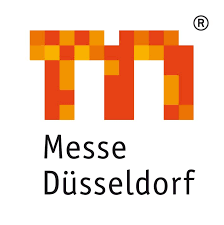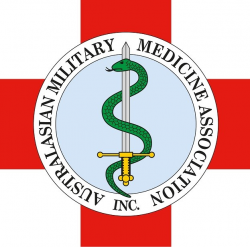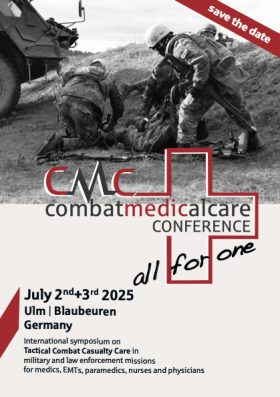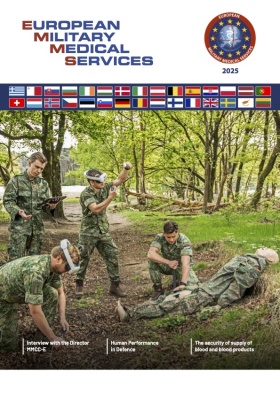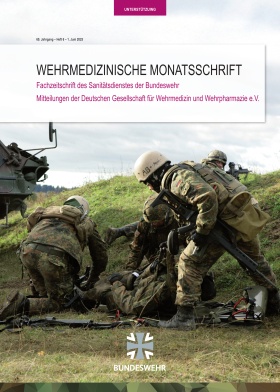
Almanac
Lebanon, Republic of
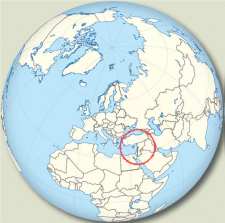

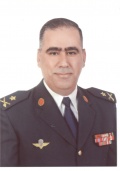
Surgeon General
Georges Youssef
Brigadier General
Source: Ministry of Defence Lebanon
Lebanese Armed Forces
Beirut-Badaro
LEBANON
Pictures and Graphics: Wikimedia Commons
Basic Task of the Military Medical Service
It is the right for the military community to receive medical care, all kinds of therapies, paramedical care, medications, prosthesis, medical devices, implants and aids with no copayment and no exclusions; and this right are endorsed and provided by the Military Health Care Services in the Lebanese Army. The medical services are provided to beneficiaries who comprise around 10% of the Lebanese population. The medical corps is invariably keen to provide excellent and competitive medical services either at the military health care facilities or at the private sector in secondary or tertiary care hospitals and diagnostic medical centres. Referring beneficiaries to the private sector is done in case of unavailability of the medical service and with full financial coverage. The beneficiary has the right to receive his medical care even abroad if the service is locally unavailable. The military health care services ensure that medical care conforms with Good Medical Practice guidelines in an era of emerging health challenges and changing economies of scales. This is accomplished by the periodic training of the medical corps and supporting continuous medical education through annual international or local courses and programs. Besides, the Military Health Care services provide policies for preventive medicine, field sanitation and general health awareness. Another mission for the Military Health Care Services is to provide medical support, evacuation (land, air, water) and treatment for casualties during disasters and wars.
Beneficiaries:
• Active duty members and families
• Retired members and families
• Civilian employees (active and retired) with families
Structure:
Regional Medical Facilities
There are five Regional Health Care Facilities distributed in the five main regions. These Regional Health Care Facilities manage 34 dispensaries that serve as primary health care centres to all beneficiaries. The regional medical facilities include outpatient departments for medical consultations, laboratory, radiology, dentistry and pharmacies. The regional health care facilities are connected to the Central Health Care Services by a network of the health system.
Military Hospital
The military hospital located in Beirut accommodates 20,100 admissions per year with 9,011 annual surgical operations. About 2,790 surgeries are ophthalmic, 2070 are orthopedic, 1780 are general surgeries, 1020 are urology surgeries and 600 are ENT. The main Central Military Hospital is constituted of Medical and Surgical Departments supported by Laboratory and Radiology departments. The services are provided through, Department of Internal Medicine, Department of Oncology and Hematology with 4120 chemotherapy sessions per year, Hemo-dialysis with 6000 sessions per year, Intensive Care Unit, Cardiac Catheterization Unit, Endoscopy, besides surgical departments mentioned above. In addition, the Outpatient Department provides a wide spectrum of all medical consultations including Pediatrics, OBSGYN, Ophthalmology, Psychology, Speech Therapy and Dietary.
The Central Military Hospital hosts fellowship and internship programs for medical schools, schools of nursing, departments of pharmacies and physiotherapy of reputable universities in Lebanon such as of the Lebanese University, American University of Beirut, Saint-Joseph University, Lebanese American University, Balamand University and others.
The Emergency Department at the Central Military Hospital has 750 m2. Besides its role in receiving cases of medical emergencies in its sections which are the triage section, stabilization section, trauma sections, surgery room, medical sections; it plays a major role in the area of Beirut and Mount Lebanon due to its elevated capacity in receiving casualties in times of crisis or wars.
The Cardiology Center (cardiac cath)
It ranks as the first in Lebanon in terms of the number of medical procedures since it performs around 2100 diagnostic procedures per year out of which 1100 are interventional. It is the busiest centre among all Lebanese University Hospitals. Many complex PCI is performed (unprotected Left Main, bifurcation, CTO).
In addition, the Cardiology Center hosts a fellowship program accepting residence from many medical schools in Lebanon; the Lebanese University, Saint-Joseph University as well as the Balamand University and others.
The Radiology Department
The Radiology and Medical Imaging department at the Central Military Hospital integrates state-of-the-art equipment which are:
1-Multi detector CT scan;2 Fluoroscopy DRF; 2 Flat panel DR; 2 Ultrasounds, 1 Mammography, 1 General Radiology located in the Emergency Department, 2 mobile X-Ray units. The annual workload for the CT scan is 12,000 patients; as for Fluoroscopy and General radiology 70,000 patients, Mammography 4,000 patients and Ultrasound 12,000 patients.
The Endoscopy Department
The endoscopy department performs a wide variety of interventions namely diagnostic gastroscopy and colonoscopy as well as therapeutic ones (averaging 2600 procedures per year, 6 days a week).
In addition to the above-mentioned procedures, the following are been done: ERCP, Endoscopic Ultrasound, LVO, Breath Test, Videocapsule and Bronchoscopy.
Moreover, the surgery team undertakes advanced laparoscopic procedures such as laparoscopic colectomies and gastrectomies both for bariatric and oncological reasons.
The Hemo-dialysis Department
The Hemo-dialysis department includes 17 state-of-the-art Hemo-dialysis machines Fresenius 508 conducting around 6000 sessions annually. The water treatment technique adopted is Ultrapure Water and Double Reverse Osmosis. The department also provides peritoneal dialysis with both CAPD and APD modes of treatment. Also, end of stage renal disease patients who need kidney transplantation are completely prepared before they are referred to contracted hospitals for the transplantation.
Special Medical Procedures at the Central Military Hospital
The science of dermal regeneration: Integra-artificial skin.
Integra dermal regeneration template is commonly used worldwide. However, it is new in Lebanon and the central military hospital is one of the leading hospitals in Lebanon that started the first application of artificial skin. Integra template is a material that can be applied to resurface areas of scarring, burns, contractures, exposed wounds and foot ulcers. It uses ‘biocompatible’ cross-linked collagen/glycosaminoglycan (GAG).
Special Institutes/Divisions in the Military Health Care Services
Military Health School
The Military Health School offers a wide range of training courses in its curriculum of which are: Combat Medics, Combat Life Saver, Field Medics, Tactical Combat Casualty Care as well as foreign languages.
Besides, the Military Health School hosts foreign military training teams to deliver a spectrum of International courses at its premises for example Disaster Planners, Bio-security and Biosafety, Pandemic Management, Public Health Emergencies, Health Systems Development and Best Practices, Mass Casualty Response for Primary Care Providers, Biological Weapons and Emerging National Security Threats Planning and many others related to preventive medical care.
Moreover, the Military Health Care medical corps is enrolled in Advanced Trauma Life Support, Advanced Trauma Care for Nursing, Basic Life Support, Advanced Cardiac Life Support Course and Emergency Triage Course.
Abroad, Officers and NCO attend training courses in the USA such as Basic Officer Leader Course, Captain Career Course, Medical Logistic and Preventive Medicine.
Division of Health and Safety
The main tasks of this department are:
- Vaccination campaigns in various military units or as needed.
- Monitoring and evaluating occupational hazards such as exposure to ionizing radiations, exposure to chemical hazards, and ensuring biological safety.
- Monitoring the compliance by hygiene standards
- Cooperates with the Ministry of Public Health in the event of the appearance of a transmitted disease or any outbreak for the welfare and protection of the military corps and those in contact.
Field Deployments
The treatment chain for wounded soldiers starts at the Point Of Injury by medics and buddy aid. Next, a Casualty Collection Point is identified where patients are collected for, triage, stabilization and resuscitative care if needed. From this point, medical evacuation shall be done to a field hospital. However, the medical evacuation whether by land or air is mostly done to the Central Military Hospital or contracted civilian tertiary or secondary care hospital since Lebanon with its relatively small geographical area of 10,452 km2 has around 170 private hospitals distributed all over its regions out of which 117 hospitals have contracts with the Military Health Care Services. Hence, the scale of field deployment is adjusted according to the size of the country.
Civil-Military Cooperation
The Military Health Care Services is a major stakeholder and responder during national disasters whether natural, aggressions, wars, displacement, aircraft crash, epidemics and others. The cooperation with the civilians is defined by providing search and rescue of victims. It includes channelling medical aids from international agencies to the civilian authorities.
(status: 24 June 2020)

